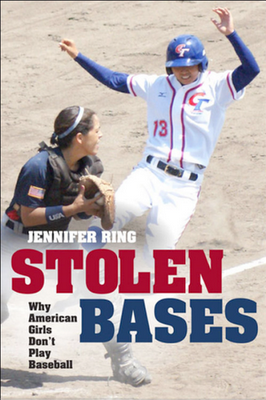Stolen Bases: Why American Girls Don’t Play Baseball

Stolen Bases is as intelligent and powerful as any professional U.S. women’s baseball team would be, should be, and could be...if any were supported enough to exist. The book is a concise 180 pages, an assertive objection to the current status of baseball in the United States in its exclusion of women, and a worthwhile read for those who find themselves in the middle of the Venn diagram of athletes, spectators, and feminists.
Judging a book by its cover, it’s serious: red, white, and blue varsity-style lettering covers an action photograph of real women playing real baseball. I like that casual bookstore browsers may take in this positive representation as they walk by, and I’d encourage readers to pick it up.
The book’s subject matter is framed by author and political science professor Jennifer Ring’s personal love of baseball, and she uses the prologue and epilogue to recount her family’s attempts to make baseball more inclusive for her daughter. This, in turn, makes the issues feel more urgent and tangible. The reader is also drawn in by the humor inherent in the chapter headings, and even by small details like the author’s parenthetical inclusion of her friends’ and mentors’ favorite baseball teams in the acknowledgments.
The heart of the book, though, is a harder read. It is well-paced, informative, and is evidently well researched and supported. Baseball’s history is explained, almost decade by decade, and then systematically deconstructed to identify the choices, conditions, and decisions that have almost always led to the exclusion of women on all but the most amateur levels.
The book’s pace eerily echoes the history of baseball’s treatment of women. Again and again, Ring’s narrative excites and includes the reader, only for another obstacle to interrupt what could have been an amazing victory for female players and fans of what is culturally asserted to be a “national pastime.” Stark facts and their interpretations could make for depressing reading, but Ring’s skill as a storyteller is to weave her own wry asides into the account, acting as a guide the reader can identify with during the bleaker eras in women’s baseball history, and as a comrade when celebrating women’s baseball successes.
Stolen Bases most certainly supports feminist values, and is also particularly inclusive of race and class in its arguments. It does not, however, go into any depth regarding lesbian players (other than a cursory mention of ‘lesbianism’ being one of the feared outcomes offered up by those who opposed pro-ball for women). It also assumes the reader defines gender as a binary concept for the purposes of the arguments contained in the book.
By the end of Stolen Bases, many readers will feel spurred into action. Ring would have done well to include a model for grassroots supporters and a practical outline for baseball professionals and governing bodies, perhaps in appendices.
A few weeks ago, a girl named Mackenzie Brown in Bayonne, New Jersey hit a perfect little league game. Thanks to Stolen Bases, I’m much more able to appreciate what a fantastic achievement this is, and how much work still needs to be done to further promote women’s inclusion in baseball.
Ack! What an obvious blunder! I'm tempted to get that corrected - thanks. Actually it talks about collegiate softball a fair bit, specifically in reference to title 9 and funding of collegiate sports, and also touches on pro softball.
Thanks for your comment. :)
xChella
Just a baseball terminology note- you wouldn't say that someone "hit" a perfect game, since a perfect game is when there are no hits and nobody gets on base. This girl _ pitched _ a perfect game. Does this book talk about pro or collegiate softball much? Sounds like an interesting book- I love reading about women's sports.
I've had this on my wishlist for awhile. Thanks for the review!